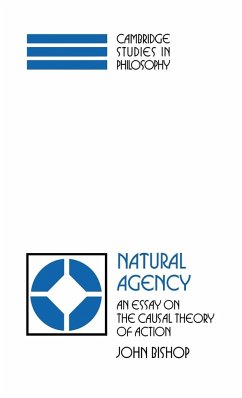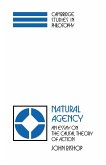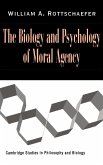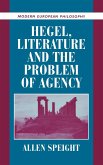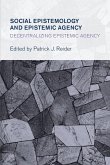From a moral point of view we think of ourselves as capable of responsible actions. From a scientific point of view we think of ourselves as animals whose behaviour, however highly evolved, conforms to natural scientific laws. Natural Agency argues that these different perspectives can be reconciled, despite the scepticism of many philosophers who have argued that 'free will' is impossible under 'scientific determinism'. This scepticism is best overcome, according to the author, by defending a causal theory of action, that is by establishing that actions are constituted by behavourial events with the appropriate kind of mental causal history. He sets out a rich and subtle argument for such a theory and defends it against its critics. Thus the book demonstrates the importance of philosophical work in action theory for the central metaphysical task of understanding our place in nature.
Table of contents:
Acknowledgments; Introduction; Notes; Part I. The Problems of Natural Agency: 1. A theory in serach of its problem; 2. Commitments of the ethical perspective; 3. Commitments of the natural perspective; 4. The core of the problem of action - and a plausible solution; Part II. The Value of a Causal Theory of Action: 1. A traditional approach to the problem of natural agency; 2. Is action possible under determination 3. Is action posisble under indererminism? 4. A comparison with Dennett's elbow room; 5. The conditional analysis argument; Part III. Developing a Causal Theory of Action: 1. Causal analyses of action; 2. The challenge of Akrasia; Part IV. The Challenge of Causal Deviance: Part V. Coping with Basic Deviance: 1. The promise of the sensitivity strategy 2. Alternative versions of the sensitivity strategy; 3. Assessing the sensitivity strategy 4. Sensitive and sustained causation; Part VI. Limits for the Causal Theory of Action: 1. Dealing with the Agent-Causationist syndrome; 2. The place of th4 causal theory of action in the wider project of reconciliatory naturalism; Bibliography; Index.
From a moral point of view we think of ourselves as capable of responsible actions. From a scientific point of view we think of ourselves as animals whose behaviour, however highly evolved, conforms to natural scientific laws. Natural Agency argues that these different perspectives can be reconciled, despite the scepticism of many philosophers who have argued that 'free will' is impossible under 'scientific determinism'.
This the book demonstrates the importance of philosophical work in action theory for the central metaphysical task of understanding our place in nature.
Hinweis: Dieser Artikel kann nur an eine deutsche Lieferadresse ausgeliefert werden.
Table of contents:
Acknowledgments; Introduction; Notes; Part I. The Problems of Natural Agency: 1. A theory in serach of its problem; 2. Commitments of the ethical perspective; 3. Commitments of the natural perspective; 4. The core of the problem of action - and a plausible solution; Part II. The Value of a Causal Theory of Action: 1. A traditional approach to the problem of natural agency; 2. Is action possible under determination 3. Is action posisble under indererminism? 4. A comparison with Dennett's elbow room; 5. The conditional analysis argument; Part III. Developing a Causal Theory of Action: 1. Causal analyses of action; 2. The challenge of Akrasia; Part IV. The Challenge of Causal Deviance: Part V. Coping with Basic Deviance: 1. The promise of the sensitivity strategy 2. Alternative versions of the sensitivity strategy; 3. Assessing the sensitivity strategy 4. Sensitive and sustained causation; Part VI. Limits for the Causal Theory of Action: 1. Dealing with the Agent-Causationist syndrome; 2. The place of th4 causal theory of action in the wider project of reconciliatory naturalism; Bibliography; Index.
From a moral point of view we think of ourselves as capable of responsible actions. From a scientific point of view we think of ourselves as animals whose behaviour, however highly evolved, conforms to natural scientific laws. Natural Agency argues that these different perspectives can be reconciled, despite the scepticism of many philosophers who have argued that 'free will' is impossible under 'scientific determinism'.
This the book demonstrates the importance of philosophical work in action theory for the central metaphysical task of understanding our place in nature.
Hinweis: Dieser Artikel kann nur an eine deutsche Lieferadresse ausgeliefert werden.

